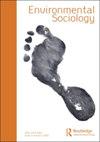西澳大利亚的社会正义、气候变化和气候政策
IF 2.8
Q3 ENVIRONMENTAL STUDIES
引用次数: 3
摘要
气候变化是一个社会正义问题,处于不利地位和边缘化的人群最容易受到气候变化的影响。2019-2020年,西澳大利亚州政府举行了世界上第一次关于气候变化和健康的调查。调查报告、意见书和听证笔录为证明气候变化加剧和加强西澳大利亚州在卫生、经济、两性关系、获取和包容等领域现有的社会不平等现象提供了虽少但越来越多的证据,作出了重要贡献。然而,在2020年底,西澳政府发布了长达38页的气候政策,其中对社会正义的提及非常有限,而且只使用了一次“人民”这个词。我们批判性的交叉女权主义分析发现,在西澳,气候证据和气候政策之间存在普遍的不协调。西澳的气候治理即使不是不愿意,也没有准备好支持处于不利地位和处于气候危机前线的人们。迫切需要制定政策和采取行动,在气候变化减缓、适应和灾害应对等各个领域解决气候变化下的不平等问题。本文章由计算机程序翻译,如有差异,请以英文原文为准。
Social (In)justice, climate change and climate policy in Western Australia
ABSTRACT Climate change is a social justice issue, and people who experience disadvantage and marginalisation are most vulnerable to the impacts of climate change. In 2019–2020, the government of the state of Western Australia (WA) held the world’s first inquiry into climate change and health. The Inquiry report, submissions, and hearing transcripts make an important contribution to a small but growing body of evidence that climate change exacerbates and reinforces existing social inequalities in WA in areas such as health, economics, gender relations, and access and inclusion. However, in late-2020, the WA government released its 38-page Climate Policy, with very limited reference to social justice and only one use of the word ‘people’. Our critical intersectional feminist analysis finds a prevailing dissonance between climate evidence and climate policy in WA. Climate governance in WA is ill prepared, if not unwilling, to support people who experience disadvantage and are on the frontlines of the climate crisis. There is an urgent need for policies and actions to address multiple dimensions of inequality under climate change, across the fields of climate change mitigation, adaptation, and disaster response.
求助全文
通过发布文献求助,成功后即可免费获取论文全文。
去求助
来源期刊

Environmental Sociology
ENVIRONMENTAL STUDIES-
CiteScore
4.60
自引率
12.00%
发文量
34
期刊介绍:
Environmental Sociology is dedicated to applying and advancing the sociological imagination in relation to a wide variety of environmental challenges, controversies and issues, at every level from the global to local, from ‘world culture’ to diverse local perspectives. As an international, peer-reviewed scholarly journal, Environmental Sociology aims to stretch the conceptual and theoretical boundaries of both environmental and mainstream sociology, to highlight the relevance of sociological research for environmental policy and management, to disseminate the results of sociological research, and to engage in productive dialogue and debate with other disciplines in the social, natural and ecological sciences. Contributions may utilize a variety of theoretical orientations including, but not restricted to: critical theory, cultural sociology, ecofeminism, ecological modernization, environmental justice, organizational sociology, political ecology, political economy, post-colonial studies, risk theory, social psychology, science and technology studies, globalization, world-systems analysis, and so on. Cross- and transdisciplinary contributions are welcome where they demonstrate a novel attempt to understand social-ecological relationships in a manner that engages with the core concerns of sociology in social relationships, institutions, practices and processes. All methodological approaches in the environmental social sciences – qualitative, quantitative, integrative, spatial, policy analysis, etc. – are welcomed. Environmental Sociology welcomes high-quality submissions from scholars around the world.
 求助内容:
求助内容: 应助结果提醒方式:
应助结果提醒方式:


